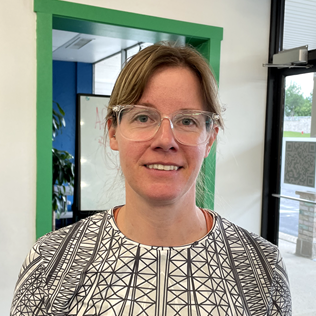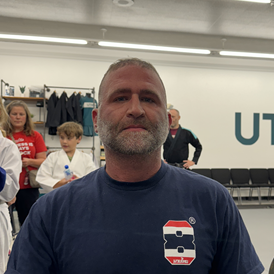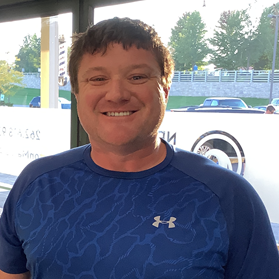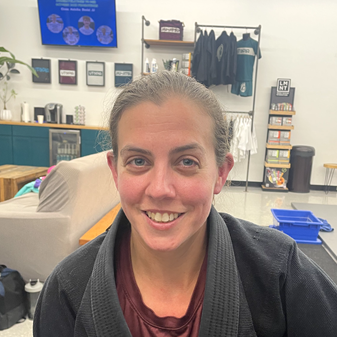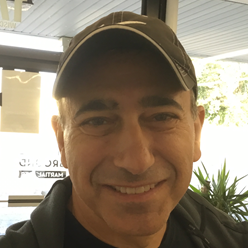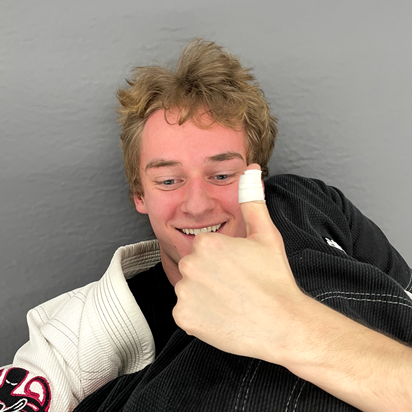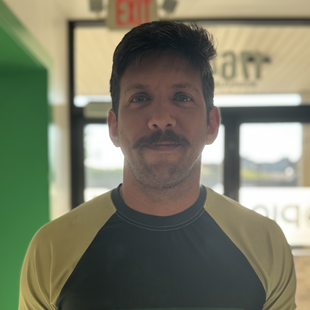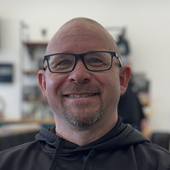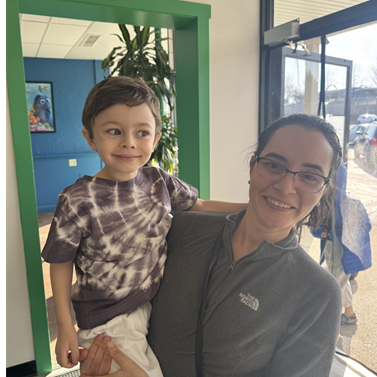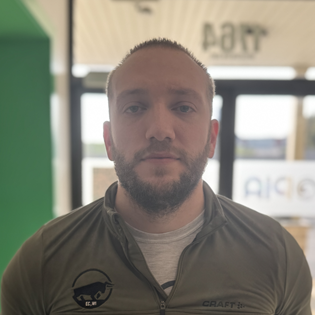When is the right time to let your child compete—and how do you keep it fun instead of stressful?
Episode 16 of Inside the Wave kicks off a four-part series on youth sports readiness, each exploring a different age group:
- Part 1 → Ages 3–6
- Part 2 → Ages 7–10
- Part 3 → Ages 11–14
- Part 4 → Ages 15–18+
In this first installment, host Perry Wirth welcomes back Chandler Lewis — sports psychologist, personal trainer, and swim coach who has guided thousands of kids from their first swim lessons to future Olympians. Chandler’s rare blend of academic expertise and hands-on coaching makes him the perfect guide for parents and coaches navigating the crucial early years of 3–6.
Together, Perry and Chandler unpack how these ages shape not just athletic ability, but also confidence, resilience, and a child’s long-term relationship with sport.
Key Takeaways
In this episode, you’ll discover:
- Why play must come first → how games and movement lay the foundation for lifelong athletic growth.
- The PIES framework → understanding physical, intellectual, emotional, and social development at ages 3–6.
- Readiness signals → how to know when your child might be ready for low-stakes competition.
- Parent playbook → do’s and don’ts that help kids thrive on the sidelines.
- The big picture → how focusing on effort, fun, and resilience today sets up success tomorrow.
Standout Quotes
“Competition isn’t bad—but at ages 3–6, it should never come at the cost of fun.”
“The best thing you can give a child in these years is freedom to move, explore, and play.”
Where to Listen
🎧 Stream Episode 16 Now:
Connect with Chandler Lewis
- Instagram: @chandlerlewis2323
- Swim Program Contact: [email protected] – official Walter Schroeder Aquatic Center email
- Championship Mind Website: championshipmind.com
About Utopia
At Utopia Martial Arts, we believe martial arts is a vehicle for more than physical fitness—it’s a path to personal growth, resilience, and community. By focusing on whole-child development, Utopia helps kids of all ages build discipline, confidence, and humility both on and off the mats. Inside the Wave extends that mission, sharing conversations with athletes, coaches, and thought leaders who embody these values.
Why This Episode Matters
For many parents, deciding when to let kids compete is one of the most confusing—and emotional—questions in youth sports. Push too early, and risk burnout. Wait too long, and worry your child might fall behind.
Chandler Lewis helps cut through the noise with a play-first, pressure-free approach. His insights show that the early years aren’t about winning—they’re about exploration, confidence, and joy in movement. This perspective is deeply aligned with Utopia’s belief that martial arts and athletics should help kids grow into resilient, balanced individuals.
Join the Conversation
This episode is a must-listen for any parent or coach of young children. Subscribe to Inside the Wave, leave us a review, and share this conversation with another parent navigating the world of youth sports.
And stay tuned: upcoming episodes in this series will cover ages 7–10, 11–14, and 15–18+, so you’ll have a roadmap for every stage of your child’s athletic journey.
Together, we can raise kids who love to move, learn, and grow—on the mats and beyond.
Transcript
Perry: Welcome to the inside the wave podcast. I am with second time show appearance, Chandler Lewis, a sports psychologist, swim coach and owner of maybe it’s the, is it the largest swim program in Wisconsin? It might be.
Chandler: One of them.
Perry: One of them.
Chandler: Us or Madison community. Yeah.
Perry: And one of the most successful ones. I know you guys have had several Olympians come onto your program, which is super cool. Today’s topic is actually going to be the start of a four-part series where we talk about kids as they develop. And we do a lot of, uh, focus on whole child development at utopia. And I thought it would be really cool to have you on the podcast to not only talk about, uh, how kids grow and how coaches and parents can understand where their kids are at to serve them best in sports, but how their development as a kid translate into. athletic development, and then how to approach competition. Because I’ve seen over the years, you have a lot of different parents with different opinions and intensities when it comes to putting their kids in competition. Um, and I think it would be really great for us to sit down and kind of map out this roadmap by age group. and give parents some practical advice and probably coaches some practical advice to tailor how they work with kids and how they present athletics and competition to their kids.
Chandler: Totally.
Perry: Um, so today’s episode, we’re gonna be talking about three to six year olds. So we’re going to start young. We’re going to go all the way up to like the high school and beyond. And I chose starting with three and six year olds because it’s the age that we start at our Academy. And I know when kids start swimming, what, what ages do kids like start swimming at?
Chandler: So like I started competitively swimming at five.
Perry: Okay, and that’s competitive.
Chandler: Yeah, I mean competitive, which is like get up on the block and try and finish at 25, but that’s cool.
Perry: I don’t even know if I could like doggy paddle at five.
Chandler: Yeah, uh, we start We’ve had four-year-olds. Okay. Yeah Um, but obviously like some lesson programming. Yeah, like we have some lesson programming and they might start off as infants and yeah work your way up and eventually some team but We’ve had limited four-year-olds, but usually it’s around that five, six range is when kids start joining.
Perry: And I think it’s important. There’s two types of competition. There’s formalized competition. And then there’s competition to just playing games in the pool. And I’m sure you guys do a lot of that, especially with younger kids, whatever those games might be. I’m sure I played a lot of them when I was swimming growing up. But we do the same thing. But the first thing I think I want to talk about, just so people understand where these age groups are at, is an acronym that we use at our academy called PIES. Have you heard of that one before? I have not. It’s one of our favorite ones, but it’s taking a look where kids are at physically, intellectually, emotionally, and socially. And I think all of those, when your coaching ends up being important, I think a lot of programs that have coaches that are volunteers, and I talk about this all the time, hats off to all the dads out there on the soccer field coaching their kids. But you’re a professional coach. That’s what you do. Um, and there’s not a lot of sports out there that have professional coaches for that broad of age group.
Chandler: Yeah. Right. I also think there’s not much education for coaches too. Yeah. Like it’s hard to, uh, to know even what you should be thinking or, or talking about with, especially this age group.
Perry: For sure. Um, you know, the, the, only the people that have that formalized education is people that were like education majors, right? Like that’s about it. And I think the benefit that you have, my team at utopia has several of your coaches at Schrader is like, because you do it as a full-time thing, you know, you don’t spend 40 hours a week coaching. no right like you as a business owner you have other time some of that needs to be like operating your business right uh checking in on your customers uh doing one-on-ones with them but a lot of it because we’re professionals we could take a lot of our work time and put that into education and seminars and workshops and stuff like that So Pius is actually one that I learned from an expert. Her name is Melody in the martial arts space. And she actually took martial arts and she’s like, what does martial arts actually do? And it’s like, well, we’re actually trying to grow a whole child. It’s like, do we want them to be great martial artists? Yes. But to be a great martial artist, like you need to develop a sort of like social acumen and emotional acumen. Because we know when you go into competition, is it beneficial to be emotionally strong and be able to handle your emotions and know how to use them? For sure. It’s not just about pure athletic development. Is the kid getting stronger? Are they getting faster? Can they kick the ball further sort of a thing? And I think that’s where a lot of the part-time coaches just does that athletic side of things. So let’s break this down. I think physical is the first thing that we can think about when we talk about these age groups. I want to separate three and four and five and six. Because there’s a huge difference between three and four and five and six. And we grouped this into this one podcast because in my opinion, true formalized competition doesn’t really start until they’re five. But those mini games to get kids used to playing games or competing, that does start when they’re earlier. And for them, it does make learning fun. Right. So physical, a three and four year old. What do you see like three and four year olds doing in a pool?
Chandler: That’s just basic, like getting comfortable in the water. Like when I was four, I was swimming a little bit, but it wasn’t like I was swimming across. I mean, I was swimming across the pool, but it was not like I’m trying to compete. Very, very minuscule when it comes to like actually swimming. Yeah.
Perry: I’m sure arms and legs aren’t working together. It’s not much worse. Yeah, not much worse. That’s awesome. So we like to think about three and four-year-olds having low muscle tone, little eye-hand coordination, And oftentimes we get parents in our academy for three and four year olds, they come in and they’re like, my kid can’t sit still. They can’t sit in one spot. But what they don’t realize is it’s because like they literally haven’t developed core strength, leg strength, arm strength to be able to physically stand in one spot. They’re stumbling because they’re not strong enough to hold their position. So one of our goals is like, okay, how do we develop that? five and six year olds, it’s a little bit different. What do you see out of five and six year olds?
Chandler: Yeah. I mean, we’ve had, we’ve had, especially on the six year old side where it’s like, these kids are actually competing. They can take in more skill. Their practices are probably longer, but by the time that they’re six, if they’ve progressed from three to four, they’re actually practicing versus play. That’s very different.
Perry: A hundred percent. Like in our three and four year old martial arts program, we actually can’t even really do jiu-jitsu with them. Yeah. Right. Like jiu-jitsu needs to be done with another person. Um, but they just, they’re not developed enough to do the sport of jiu-jitsu. So all of our goal is like, how do we get them ready for it? So I’m sure in swimming, it’s like three and four year olds, it’s probably pretty hard to teach them how to swim. But like, can you teach them how to kick? Can you teach them how to stroke with their hands? Can you teach them how to float? Can you teach them how to put their head underwater? Right? That’s critical, right? And a lot of it’s like, how do we get them ready for five and six? So five and six-year-olds, they’re actually starting to develop a little bit of strength and foundation. They still might be wobbly because they’re not strong by any means. And technique isn’t the best, but they can try. Right? It’s a little bit sloppy. So, parents out there, when you see your 5 and 6 year old not doing technique perfectly like the instructor does, that’s actually expected. If your kid was doing a freestyle stroke as good as you taught it, they’re like, how far ahead of the curve are they for a 5 and 6 year old? That’s amazing. But it’s not to be expected. And I think as coaches and parents out there, that’s the main thing is like, what is expected out of your kid? What is above the curve? And what’s you know, lagging behind? So the next one is intellectual. Where do you see intellectual coming into play with swimming? Because a lot of people, in sports, especially individual sports, it’s like, what does intellectual have to do with anything?
Chandler: Well, I think it’s more on the side of engagement, like being engaged in understanding what you’re trying to do within a practice. When I say practice, it’s not really practice, but being engaged and like, OK, this is what I’m trying to do today. This is what my coach is expecting of me today. That’s more what I think about when it comes to intellectually in swimming.
Perry: Yeah, 100%. So what we’re looking at there is three and four-year-olds, they just learn how to talk. So vocabulary is limited. They’re not very good at taking verbal cues, verbal instructions. And even at verbal instructions, if they can handle two steps, that’s amazing. But they learn the best visually and kinesthetically. And we talk a lot about representational systems and how do people learn best. You have to remember, three and four-year-olds, they haven’t even developed that verbal communication. So you almost need to take that off the table. They really need someone potentially even moving their body for them so they understand what to do. Five and six year olds though, different story. You can give them objectives, you can give them three-ish steps. They still might confuse stuff like left and right, but they’re to the point where they can do multi-step tasks. And I think that’s why we can start introducing formalized competition because they understand like start, go, stop.
Chandler: Right. And like I look at that, like for our three and four year olds, that’s still some lessons. Yeah. Five and six. You could potentially be on pre some team or some team where we’re going to teach you the fundamentals of competition. Like there’s a whistle and then you get up on the block and then this is how that works. And three and four year old never, that’s never happening. Oh my gosh. That’s not going to be a thing.
Perry: Even the steps for a three and four year old to remember in jiu-jitsu before a match starts, right? Before the grapple even starts, right? You need to stand by the scoreboard. You need the weight for the ref to bring you out. You need to slap hands, bump fists. The ref says go, then you actually do what you do in practice. That’s like six steps just to start a match. When I did my judo black belt test, or even when I compete in judo, The hardest part about competing in judo for me is remembering when to bow. There’s like 800 bows before the matches start. You need to bow before you get on the mat. You need to bow when you face your opponent. You need to take a step forward. You bow again. You bow to the referee. And then you can start. The first time I competed in judo, it was in my head around trying to remember all these steps to get to the fight. But to that point, three and four-year-olds, no way. Yeah, no way five and six, especially when you have good coaches good referees and the tournament has been tailored to their age group for sure the next one’s emotional and Man, this is a big one working with young kids that I think a lot of parents and coaches have challenges with. Because when you go into being a coach, you’re like, oh yeah, I could develop skill. I can teach how to do a technique. What you don’t learn is the emotional side of things and how important that is. What do you notice from kids three and four, five and six from the emotional standpoint?
Chandler: So one thing that I was able to identify early on, like when I was coaching five and six year olds, is like emotion regulation, specifically with genders.
Perry: Oh, yeah.
Chandler: Like, it was very noticeable that the girls were able to listen better, and go through skills way better. Yeah. I would have boys that emotionally like, you know, in being frustrated looks different from a female to a male at that age for sure. But these boys have a very hard time of connecting the skill and they easily can get frustrated easily. Yeah. You know, and it’s. The motion regulation stuff, I think with that age is really tough because they’re going to feel things. It’s important for them to feel things. And like, it’s okay to get frustrated, angry, but be able to teach that as a coach. That’s why I think that The younger kid age group, coaching really matters. Like, really matters. The difference between a good coach and a great coach at that level is night and day. Like, when you can get kids to be able to connect, and then be able to accept, like, okay, you’re frustrated, you can learn from this, at that age, that’s hard.
Perry: Yeah, I mean, man, emotions are such a superpower when you know what to do with them. And that’s the big thing. Three and four-year-olds don’t know what to do with them. Because what do we do when we have our emotions? What do we do with them? We talk about them. And remember, we just talked about that intellectually, they have a limited vocabulary. So that impacts them emotionally, because they feel all this stuff. but they can’t label it, they can’t describe what it is, so quite often they end up shutting down.
Chandler: Yep, and I think at the age group of five and six, you can have serious impact, both either negatively or positively. Like you are setting the foundation of how they’re going to look at and approach emotion. Like it’s very clear to me when I’m coaching 18 year olds now, that this was either stunted or developed at six. That could be a coaching thing. It’s obviously a big parental thing. But as a coach, if you have a five and six year old that’s getting angry that they can’t execute a skill, you can coach that up in a way that’s looked at as a positive thing. Like, you’re getting frustrated because you really care. You’re getting frustrated because you’re trying to learn this thing. Frustration is just the path of learning something.
Perry: And like, literally neuroscience, like, your frustration, when you conquer it, forms stronger neurons in your brain to develop that skill.
Chandler: Right. And that can get set up very early on. I mean, even at three and four. but more foundational at that five and six level. Yeah, because now you’re you’re going to practice and it’s in sport, and you’re cognitively a little bit more aware, and you might feel things differently. And now you’re like, I like this. And I’m trying to execute these new skills. I think it’s a, that’s a critical age.
Perry: Yeah. Um, so, you know, emotional for three and four year olds, strong preferences, big fears, they might shut down, get anxious, don’t know how to handle it, don’t know how to communicate it. And we need to like push them and hopefully get them past the curve using our sports to better communicate that stuff, to realize that it’s OK and how to communicate it. Those five and six-year-olds, a lot of their attention ends up being tied to having fun. So three and four-year-olds, they want to please their parents, because that’s what they’ve been around. As their five and six that are now amongst peers, they just want to have fun. But they might lose control. if they’re having too much fun and something doesn’t go their way, or they start becoming unhappy, right? And I think that’s just another great point for parents to think about is, you know, emotionally, what’s driving their attention?
Chandler: Yeah, that’s the other thing too, within our sport is like, we get kids before any other sport. 100%. Those kids that are gonna choose to play baseball, soccer, football, jiu-jitsu, whatever, are walking in the doors at maybe potentially six to eight months, years old. And then they, at some point, they go through the assembly line of, all right, we’re learning how to put our face in the water, and blah, blah, blah. And now they’re on some team. And we lose kids at that five to six range. To other activities. To other activities because, especially on the boy side, is it’s not fun and it’s too like labeled. And when you talk about play, that’s how I look at this age group. It’s like play. What does that mean in a swimming environment? You know, I’ve had, we’ve had coaches in the past that I’ve watched you know, take away that fun spirit, especially on the boys’ side, where they’re jumping off the block or they’re dipping underwater and they’re slapping the other friends. Like, we can look at that as like, that’s a behavioral thing. I look at it like they’re playing and we’re keeping it fun, you know? So it’s like a balance of the two things.
Perry: Man, it has to be, especially in a competitive environment. it can’t, like play needs to still have a target for development. And just because you’re learning something doesn’t mean it doesn’t have to be fun. Are there going to be times I’m sure in swimming where you just need to fricking put in the work and swim laps and like do the tedious? Yeah, but that’s also the learning moment to develop discipline. But you know, I’m sure you guys have this too, but one of our goals of every practice, like no matter how hard that practice is, The kids need to leave with a smile. So a lot of times, we wrap up stuff with the games, right? You might have had, halfway through class, have had the hardest role ever and got submitted 10 times, right? But we need to find a way to take the kids out of that so that’s not the last thing they’re experiencing before they go home, especially in that five- and six-year-old group. Me as an adult, I love that. Like eventually you learn that when you lose, you learn more, right? Because it helps you identify all your different opportunities and room for improvement. But five and six year olds aren’t going to get that.
Chandler: Yeah. It’s hard to recognize that. Yeah.
Perry: And the last one, so physically, intellectually, emotionally, the last one’s socially. And we see this all the time, right? Socially, for three and four-year-olds, there’s like not much there, right? They’ve been primarily at home. They maybe have been in play dates. Most of them have potentially even not been in classroom situations yet or group situations. It’s funny because Parents will watch our three and four-year-old class when we put kids on like little dots Maybe like four feet apart from each other at the beginning of class and those three and four-year-olds just sit like this Just staring straight at the wall for like five minutes before class starts and the parents like wow They’re so focused like you should see the five and six-year-old class. So like they’re even better I’m like no they’re the complete opposite because they just learned how to talk and they’re like social development is skyrocketing at that point in time and Right? So those three and four year olds, everything’s, you know, socially is centered around a lot of individual play. But a lot of mimicking, right? They’ll mimic their peers. They don’t know how to communicate. Right? So they’re not verbally. So a lot of their social interaction is physical. So a lot of like bumping into each other, poking each other. Same thing with the coaches, right? They can’t socially communicate with coaches either. How do you guys structure learning for three and four-year-olds in swimming to kind of handle that social side of things?
Chandler: Well, I definitely think for us, like three and four is going to be some lessons. Yeah.
Perry: And probably a really, really small group.
Chandler: Yes. Very limited, limited amount of kids per group. Parenting me, sort of a deal. Yeah. Kids have to, I think one of the issues with some lessons is that, and you’ll see this all the time, they’ll take one kid, they’ll work with the kid on a skill, and then the other three kids are on the wall for three to four minutes. That three to four minutes that they’re sitting on the wall, it’s just a waste of time. It’s like you gotta keep kids busy, and you can try to interact in those smaller groups, but if you’re in a group of eight, You’re not going to get anything done.
Perry: We have a concept that we try to call a zero downtime class. And to do that, you need to keep groups small. You need to keep the adult to kid ratio high. There’s ways to do it. You just either need more instructors or less kids or bring in parents to help with that. But it’s important because we need to realize that kids don’t have patience. right? And parents are paying for it too. They don’t want to pay for their kid to sit on the sidelines the entire time. Is there value in watching and observing? For sure. Yes.
Chandler: Then you get into this spiral where it’s too much time. Yeah. So that social Understanding what’s a group size is important. Like you get to the four or five with one teacher, that’s too much.
Perry: Yeah. So what about five and six year olds socially?
Chandler: I mean, those kids are now, like the goal is now they’re joining the pre-sub teams. Now they’re in a bigger pool and now it’s more structured some practice. And instead of having one instructor for two to three kids, there’s three coaches for 12 kids. It’s not, you know, practice is now moving differently and we’re gonna line up and we’re gonna go in these lanes and that’s your lane and you’re not going in the other lane and we’re gonna pick a leader and that person, that’s like the introduction.
Perry: They start loving having fun. They love that little competition side of thing. They love winning, right? We do a lot of like, Contests like who’s gonna win the boys or the girls and like a lot of it. Yeah, like they love it but the things you need to watch out for socially is like they also haven’t developed the Knowledge or discipline to avoid the bad social habits like cheating Bragging when it comes to it right sulking when they lose So that’s the balance that we need to do as coaches, right?
Chandler: Yeah. There’s a lot of five and six year olds that do not know how to properly communicate. Like, Oh, I, I go in front of you cause I’m better than you. Yeah. It’s like, okay, all right.
Perry: I’m sure they’re just like side splashing their friends at the, at the pool.
Chandler: Let me go in front of you. I’m better than you, but we have, we try to create, I mean, you have to create game and the kids love that type of stuff.
Perry: We do a lot of ecological learning. So we do two different teaching methods in our gym. Traditional, which is I’m going to teach you step one, two, and three. You go do step one, two, and three. Now you have a technique. The other one is ecological. It’s where you have your two opponents, and you create a little mini game. And that game has rules or constraints and an outcome. Person on bottom, this is your goal. Person on top, this is your goal. Here’s what you can do, or here’s what you can’t do. In those games that we play with five and six-year-olds, they will find any way possible to cheat. Any way possible to just game the system. And it might even game the system to make the other person not win. And that’s the one that frustrates me the most. I’m like, no, you still need to try to win. Your goal is to win, not to not lose. But man, I find it hilarious. And I get better and better at teaching them as time goes on. But it just catches me every time, like, every time I do a new game, I’m always wondering, like, who’s going to game the system and how?
Chandler: Yeah. Like how are they going to cheat? You pointed out like that. I’m like, yeah, that’s totally a thing.
Perry: So that’s pies, man. And understanding where like a kid is at at a whole, right, really leads to us being able to have a strong athletic development with a kid. Because without these pieces of the puzzle coming together, I think that is the base of my pyramid when it comes to kids in sports, is these four things. And as we go up, from there, in my opinion, is athletic development, and then it’s competition. Going out there, winning, being the best of the best, and stuff like that. Let’s talk about athletic development. Your gig before sports psychology was athlete, personal trainer, not just developing people in the pool, but developing people in the gym. Did you do strength training for kids at all? What age, I know that’s probably not three, four, five, and six, but there’s things you can do. Not like weight room stuff, but there’s things you can do there.
Chandler: You know, I started teaching kids land movements, which I called dry land, at like seven and eight. And it was basic things, like learn how to push, learn how to do a pull, and that was like lunges, squats, learning how to walk, jump, move in this direction, that direction. We started at like seven and eight, and then eventually at like nine and ten, reintroduced more things. Eventually it’s like, all right, learn on a hinge. So when it comes to like lamb movements, I think that you can start at a very, like I think you can start young. When it comes to like loaded lamb movements, You know, I worked at a gym called Athlete Performance, and it was strictly athlete-based community. And we were in the Mequon area, so we would get calls from the North Shore moms like, my kid’s eight and ready to strength train.
Perry: No, my kid’s eight.
Chandler: And he’s going to be an athlete. They’re going to be a D1 scholar athlete. And we’d have to be like, listen, we’ll take on your eight-year-old, but we’re going to teach him how to run. We’re going to teach him how to jump. We’re going to teach him how to play on our turf area. We are not putting a weight in his hand. I did strength train some 12-year-olds. But it was like, and I think you can do it if you have a good coach. Yeah, middle school age is like when you’re starting. Middle school age, and it was very basic, even 11. I think at 11 years old, you can start strength training, minimally, but at basic movements. So by the time that you’re 13, 14, you’re actually training.
Perry: I like the acronym ABCs, or ABCS. The ABCs, don’t forget the S at the end. Agility, Balance, Coordination, and Spatial Awareness. And I tell parents all of the time, like the best activities that you can be putting a three to six year old in are ones that focus on all of those, right? Swimming being one martial arts, being one gymnastics, man, dance, because all these kids are moving in non, not just linear spaces.
Chandler: Yep. If I were to tell a parent to put them into a sport, that would translate in athletic ability, I would say gymnastics.
Perry: And essentially like gymnastics programs and our three and four year old program in martial arts is pretty much the same thing.
Chandler: Um, so obvious to me when, when I’m coaching, when I used to coach 12 and unders, it was so obvious to me when there was a gymnast, like you were in gymnastics.
Perry: And there’s nothing against like, actually have a lot against like three-year-old soccer and stuff like that.
Chandler: Yeah.
Perry: Because half the time, it’s just like a ball. And it’s not zero downtime, right? It’s massive downtime typically, because you can’t track 15 kids with soccer balls running everywhere. They don’t work well with each other. They can’t play pass. But the challenge with all those other sports is it’s running.
Chandler: Yeah.
Perry: Like straight running and your kid can run anywhere. They need to be moving in space. Um, water’s really cool. That water lets you move in space, right? There’s, uh, there’s so much rotational aspect to swimming. Um, and not only does it develop a good athlete, it’s also. A very important skill that everyone should probably have.
Chandler: Yes. Life skill.
Perry: For sure. I had a parent, side story, I had a parent at my academy, Keith, he’s been on the podcast. He had his son in our martial arts program and he did a testimonial for me once and totally unprompted, he was like, I’ve always wanted my kid to learn about three things when he’s growing up. Learn how to swim, learn how to defend himself, and learn about money. And he’s like, my kid learns those three things, whatever else he wants to do, Do it. Yeah, and I was like, that’s brilliant. The money thing was interesting to me Because but it’s because he didn’t learn about money growing up a lot of people don’t learn about money growing up and by the time You need to learn about money It’s sometimes too late, right? Like it’s very important. It’s a very important thing because adult world revolves around it. But I thought, I was like, that’s cool. So three and four year olds, it’s like, dude, do martial arts, do gymnastics, get them moving around. They will run on their own. Get them rolling, spatial awareness, eye-hand coordination. I was just talking to a bunch of other martial arts coaches. We do evaluations for our three and four year olds and a lot of them is like Can you throw a ball? Can you catch a ball? Do you know left? Do you know right? Can you follow two directions? But it’s all just basic stuff that you can do at home playing with your kids yeah five and six year olds they can start doing a little bit more, right? Dude, watching three and four-year-olds jump is the funniest thing, because it’s kind of like a gallop.
Chandler: Yeah, yeah. I can see it in my head.
Perry: But five and six-year-olds, they can start doing some more dynamic stuff, right? They can jump. You can start including drills and precision and a little bit More in them. What are you guys doing? I know I need to do some like land stuff But what are you doing to just develop general athletic skills in the pool for your early athletes?
Chandler: Yeah. Well, I mean I’ve always had a general idea when it comes to some lessons. It’s like I Whenever it was years, years, years ago, Red Cross came in with some lessons and developed a plan that majority of people follow. So where you probably learned how to swim.
Perry: Cedarburg Pool. Is that where you went?
Chandler: So Cedarburg Pool, we got taught Red Cross some lessons where you go level one, level two, level three, and then you work to level 10. And eventually it’s like, you’re on some team. I have felt that that system is wrong. And I would rather see some lesson done where, you know, like obviously at some point we got to learn, we got to teach how to put your face in the water and we got to teach how to, you know, like blow bubbles and exhale in the water. But at some point it should turn into play. So it might be like, okay, we’re going to go through the hoops underneath the water, or we’re going to learn how to do a dolphin dive and then push off the bottom. Like, that’s how I think that people learn how to swim better. Some of the best swimmers ever, like I have a buddy where he didn’t join like traditional training swimming until he was 14 years old, but his whole childhood was spent in lakes. and at the Cedarbrook pool where you’re doing sharks and minnows and you’re moving around. And that developed, that’s play, but that isn’t a traditional sense of learning how to swim. So when it comes to what I feel is the best way to develop at a young age is through play in the water. So that is like bobbing your head underwater, looking for the reins on the bottom, but then going through that all the way to the age of five and six, where it’s like the traditional, I think what people do and get wrong is the traditional swim practice of this is the stroke that we’re doing, this is the skill we’re trying to develop. It’s like we gotta make it a little bit more play, but introducing basic awareness on land translates into the water. So like with five and six year olds, teach them how to roll. That’s a basic, and not many kids know how to do that.
Perry: It’s a very… Like a somersault?
Chandler: Yeah.
Perry: That’s hard. Yeah, because you have to do that when you turn in swimming.
Chandler: But it just… I have a true belief that if you can create awareness on land, it translates to athletic ability in the water. That’s why gymnasts are so good, and they can go right into it. It’s because they have awareness of their body. Uh, when you do soccer, like you have awareness, but like you said, you’re just running around. It doesn’t translate to athletic ability.
Perry: Yeah. Especially at that age when. It’s still all very solo, like they’re not running complex plays or strategies or things like that. Right.
Chandler: So like we’ll have kids jump off the block in hopes that someday they’re learning how to actually jump off a block when they’re going into a dive. But I think that all that work is done earlier ages and then setting the tone where you’re doing land movements that translate into athletic movements in the water.
Perry: Do you ever get like… complaints from parents that you’re doing too much play, not enough, like, why are they swimming more laps?
Chandler: Definitely. I mean, we get complaints over everything, but you know, we’ll have parents that believe that their kid needs to do more swimming at the age of six. And it’s like, that’s not the goal at six.
Perry: Yeah.
Chandler: No, that’s not really the goal at all. You know, I think there has to be progressions, but we’ve gotten numerous parents that believe that their kid should be doing X and swimming for X amount. And then we believe, no, that’s not what we’re doing here. That’s not the goal. Like that’s misses the point of this foundational group. Sure.
Perry: Um, man, so we’ve talked about pies. We’ve talked about athletic development, ABCs, anything else on those two before we go into like approaching competition? Um, informal and formal for these ages.
Chandler: Yeah. I mean, I think we covered it, right?
Perry: Because once they’ve developed the skills right now, they can actually do something with them.
Chandler: Right.
Perry: Right. Um, sometimes at some point in time that the games are over and it’s time to go out there and like compete.
Chandler: Yeah.
Perry: But let’s talk about competition, because parents want it. We have our three and four-year-old class, so we do our Utopia Open. We have 80 of our members do an in-house tournament, but we only do it for ages five and up. We always get parents, three and four-year-olds, like, I want my three-and-a-half-year-old to compete. Hold on. Yeah, I would sign that yeah And so we don’t Do that, but what we do do is do the mini competitions in class, right? Our goal for three and four four-year-olds is just to get their feet wet Right start developing that instinct of like it’s a competition. Someone is a winner Not that it’s like the end all be all twin that’s not their objective to win but it’s to be known that like hey at some point in time someone’s trying to beat the other person right um so we talked about it a little bit but when when are those youngest age like how do you identify when someone is ready to compete
Chandler: Yeah. I mean, there’s obviously, there’s definitely a skill thing. Yep. You know, like you obviously have to be in our pre some team or some, our little kids, we call it pre some team. It’s like some team. Yeah. Like you gotta be in those groups to be able to be able to do it. Um, when you’re in those, those groups that we call pre some team, we try to introduce competition first within practice. Yep. And if kids can handle that, so like basic things like learning how a meat runs. Yes. Like, Oh, I’m in lane four. What does that mean? I’m in heat. I’m in heat too. What does that mean? Like if, if you can’t grasp that, it’s going to be really hard for you to take the next step, which is our kind of like our mini in house competitions.
Perry: Yeah. So like super low stake format, right? And I’m sure there’s, so we have two levels of that. There’s like what we do in class, like we’ll do little mini matches in class, but then we do our in-house tournament, which is like the step up. Now you have, you’re the only match going on and like a group of people are watching you.
Chandler: Similar idea that we have.
Perry: I think a big readiness symbol too is how long the kids can stay engaged. Can they stay engaged for the three minutes it takes to completely do that swim or do that match? We have a lot of three and four year olds that, it’s so funny in that age group, they’ll be competing against someone, but they’re looking at mom and dad the entire time. Yeah, it’s just it’s so funny to watch I’m like doesn’t that hurt your neck but right can they Stay engaged in that match. Yeah What’s your mindset Hughes like differences between like the The fun ones in classes and in practice versus like your in-house little meet-and-greet
Chandler: Yeah. I mean, the key difference to me is definitely that when we’re going in practice, there’s less at stake. So like we’re trying to learn, like if you mess up and you don’t know what you’re doing, like there’s nothing on the line. There’s no one here watching you. As soon as we go into like, okay, we’re doing this kind of some meet here. Your parents are going to come to watch. We’re going to go one heat at a time and you’re going to be racing other kids. It’s like now it creates a platform of like, you’re going to get a time. You’re going to get a time. And I actually look at this sets the foundation of sport values, not by the kid, like the kid doesn’t know if that’s good or not. But the parents, like the parent has to be ready for this jump. And yeah, I laugh, I don’t coach that these pre meets, but I’m there a lot. And I start sensing like, who’s gonna be the parent? And you can see it’s so clear as day right away, you know, and it’s like, these in house meets that we have, there’s a warm-up and then there’s a heat sheet and then their board is on and you get a time and there’s yeah that’s a big deal compared to when you’re in practice where there’s low risk where it’s like hey we’re gonna have this super informal meet with 12 kids and I’m gonna tell you to step up and if you fall in the water like I’m not gonna Yeah, yeah, you know, I get penalized in a in a meet like we it’s not like we’re gonna disqualify kids in our in-house meets Yeah, but the whole pool is gonna watch all the kids are gonna have to stand up. There’s an official there’s a starter That’s a big jump. So it’s like being able to to recognize that we’re going from You know like fun in practice to like, okay now this is a competition. It still has to be fun. But now we’re gonna get, you know, I think the mistake that a lot of youth programming make early on is we overemphasize, well, everyone’s got to get their ribbons and their trophies and you’re, you’re developing sport values early on, you know, and it’s like, if we can, as coaches and as parents, at those first initial competitions, you start creating the values of like, we’re going out there today and we’re working. Competing you’re gonna try your very best you stay in your own lane. You do your own thing Yeah, we’re just going out there and we’re just gonna see if we can have some fun Yeah, and I want to see that big smile when you finish Yeah, that that’s a value that you’re creating like now at 18 the kids like my mom tells me every time I race I gotta go out there and smile. Yeah, right. I think I’ve heard parents of six-year-olds say you’re gonna get a best time today and Down the road, at 18, it’s best time, result, mom’s happy. As soon as you make that jump from in practice to real competition, you get introduced into values. We’re gonna make mistakes as coaches and parents, but the more that you can create good, positive energy around competition,
Perry: Yeah better. It’s gonna be so like moral the story. It’s like fun first. Yes, right score Score doesn’t matter. I think it’s Making a safe environment for them. So they come back and do it again. Yes, man. And here’s the other thing Swimming again the sports that we keep talking about that we think are some of the better ones are also sometimes the harder ones right because when you lose in swimming you lost in swimming yep not your team right and i think it’s one thing like when you play a team sport and your team loses you’re like oh that stinks but when you see your name last on that ladder yes it hits a little bit differently and in jiu-jitsu when you lose you sometimes really lose. Like you can lose in 10 seconds in jiu-jitsu, right? You can lose like 15 to like just wiped out, like physically just handled by the other person. Right. Um, so I think it’s even more important in our sports where when you do lose, it’s that much more apparent. And when you win, it’s that much more apparent to be able to teach the kids that like, Hey, I know you won this one. There’s going to be others. You got to come back and hit it just as hard.
Chandler: Yeah, that I that’s the hardest part. Because you can identify early on. Oh, I’m beating everyone.
Perry: Yeah.
Chandler: That means I’m good. And when I’m swimming fast, or I win, that makes me feel good. And then you search for this dopamine. Yeah, which at some point, It can be. Yeah. That’s not good. It’s one of the most latch on to you have to latch on the right thing.
Perry: It’s one of the most sneaky killer limited mindsets that you can have is that I am already good. Yep. Right. Because it limits you from being better and from trying hard to keep improving. Right. Right. And I’m sure you saw it in high school. I’m sure everyone saw it growing up. Like you have that one kid middle school high school was like top of the food chain and The only way that they went was down because that mindset of like, I’m good, didn’t serve them well.
Chandler: And then similarly with the other side, like a kid early on, they’re getting lasts. It can be demoralizing if you’re valuing the time or winning. If you value like, dude, you went out there and you tried so hard. That was awesome. I love watching you race. Even if they got last, you’re like, oh, I tried really hard. Yeah, I tried really hard. You know, it’s like, I think you have an opportunity early on as a parent and especially as a coach, where you can provide a lot of support that’s outside of the nat, like swimming, jiu-jitsu, there’s a win, there’s a winner, there’s a loser, naturally. If you can provide perspective that’s outside of that, as a coach or as a parent, you’re gonna create longevity in the sport that your athlete chooses to go through.
Perry: Yeah.
Chandler: You know?
Perry: Man, and you just gave some awesome do’s out there for the parents, right? Things that parents should do. Praise their sportsmanship. Praise their grit. If you’re going to set a learning point, just set one. You know, you don’t have to like dump everything that the kid did wrong on them. Just give one thing to work on. One small thing, right? But even for the kids that aren’t as experienced, Just even after the competition, like, Hey, what was your favorite part? What was the best part of today? So the kids, I mean, it could have just been a simple, like I get the high five from the coach I got afterwards, like help them find the fun parts of it. So they keep their eye out for the fun parts in the future. Right. But man, what about parent don’ts for this age group?
Chandler: Yeah. I mean, obviously it’s like the complete opposite where, and I’ve seen it, where it’s like the eagerness to compete, the eagerness to look for what’s next. I think it’s natural as a parent. You see your kid, let’s say they’re pretty good. And we’ve seen athletes at six years old. We’re like, okay, that kid’s good. He’s different than other ones. I think it’s natural as a parent to say, OK, well, we need to get him more because look at he’s really good. And it’s like you got to stop sign that. Yeah, yeah. You know, and what’s the goal at this age? The goal is to keep it fun. Yeah. As soon as we introduce new things and start praising this. Oh, you’re so talented. You’re so good at this.
Perry: Yeah.
Chandler: You are opening a can of worms that you won’t see right now, but you will see at some point, whether that’s 13, 14, 16.
Perry: You want to praise them for their qualities, right? How hardworking they are, how good of a listener they are. It’s like, man, I saw you so ready for that, what starts a swimming race, a whistle? Like, man, you are so ready for that whistle to blow. You beat everyone off the blocks. Whatever it might be, right? Praise that stuff. Don’t praise like, oh yeah, you’re the best.
Chandler: Oh my god, you beat everyone else.
Perry: Especially young ages, the official score doesn’t even matter. The score doesn’t matter.
Chandler: In part of our sport, which I think is very detrimental, and I’m sure with any other sport is, we’re listing times at like age six. You can make state qualifying times at the age of six if you’d really like to. We have 78 year olds that go to state meets that are competing against kids throughout the state and those are all listed. So like parents naturally start looking to what’s next. And if a parent can have that parental education early on where it’s like, hey, you know, We know that down the road, this is going to get hard and stressful if they continue in this sport. The goal right now is we’re trying to have fun. So if you’re starting to talk about state, times, results, beating other people, going to outside the region competitions, you are
Perry: uh really hurting the athlete man what and one thing that i catch bribes yeah like bribe me like we’ll go get culvers after if you do a good job i’ll get you this uh when i was growing up i i i’m all about the celebratory ice cream at the end but like don’t bribe your kid to do their best work by saying hey if you work hard today we’ll get you ice cream terrible
Chandler: It’s terrible. I grew up with a kid that I swam with, and his mom would always say, like, oh, if you go at best time, like, we’ll get you the Wii. I remember his mom saying that, and we’re like, whatever, eight. And now, like, obviously, the kid didn’t get the time, and you’d be crying or whatever. Yeah, yeah, yeah. It’s like, you are creating a really, like, do not bribe your kid on something that they want.
Perry: Yeah, for sure. Um, man, and another big one, and this is more for like parents that weren’t able to go and watch. And everything’s, I think a little bit different now that you can just essentially see everything online as it happens. Like most Jiu Jitsu. Tournaments run a platform called smooth comp, where I can just refresh from my phone. The second the match is done, it’s on my phone already. But the old one is like, you know, a kid would go home to their parents after the game. And the first thing the parent asks, did you win? Yeah. No. Again, just go back to like, Hey, what was your favorite part? What was the best part of the day? And just like, let it naturally come out.
Chandler: Yeah.
Perry: Right. Because remember winning at this age group, you know, three, four, five and six, like winning isn’t the most important thing.
Chandler: Right. And I don’t think kids at this age really have a great understanding of what that means.
Perry: Yeah.
Chandler: That is developed by your parent. Wait a second. When I beat this kid and I win, my mom and dad are really happy and they bring me to get ice cream.
Perry: Let’s be honest. When does winning ever actually matter if there is a money on the other side, whether it be a college scholarship money or like this is your professional job and you’re going to make, you’re a baseball player and you make tens of millions of dollars more if you do win. But like beyond that, when does winning actually matter, right? What every parent probably really wants is their kid to keep doing it and then be successful.
Chandler: Yeah, and learn some really valuable tools through the sport. It’s like the more that you can value the effort, the intensity that they’re bringing, how engaged they were, how great of a teammate they were, how great of a listener they were, how respectful they were. The more that you do that, you’re setting the foundation for long-term skills, learning.
Perry: Man, anything else we want to touch on for competition at this age group, I think we put some really good do’s and don’ts in there for the parents, for the coaches, like the formats you should be looking at running for it. I think overall story, it’s like just focus around fun for this age group. And I’m sure every parent has been like, yes, that’s what I do, that’s what I do. But reflect on it.
Chandler: Do you actually do it? I think naturally you go to what’s next. Oh my gosh, that’s naturally. You have to be really mindful of what you’re saying because kids at this age are like sponges. Yeah. And the more that you throw at them, they’re going to take it on, whether you like it or not. And we can see it later on in their development, but you’ve got to be mindful.
Perry: Yeah, man. So we did, uh, pies physically, intellectually, emotionally, and socially development for kids. We talked about, um, how important it is for those kids, um, three to six to develop just those core ABCs, um, stress free first competitions, right? Fun first. How do you ease them into it? Coaches versus just like throwing them out there to the wolves. Um, What’s a good challenge for parents to do, reflecting on this podcast, as the parent of a child athlete? Because I think parents forget that they have a huge job in the success of this. And it is taking what we do in our clubs or academies or whatever it might be home. Now, one thing that we like to start doing with this age group is giving kids a little bit more control because that’s something that they’re going to have to develop in their own skill development too, right? So like, hey, your job is to pack and unpack your gear bag. Just for a week ownership. Yeah start developing that Any challenges you ever give to parents?
Chandler: Yes, I mean Naturally parents want the best for their kids for sure when they see their kids struggling They have a internal thinking that I need to go solve that for them So like we’ll have parents at at some meets and practice they’ll see their kid getting either angry or something happened to them and They will barge in and they will interrupt a practice, they will interrupt a meet, they will try to solve the issue for the kid.
Perry: Dude, I see that all the time. I will walk past a group of kids practicing a technique, and it’s not quite right, and I won’t help them. I’ll just walk straight past, and the parents are like, you’re not helping my kid? Why aren’t you helping my kid? I’m like, because they’re close, they know they’re close, and if they get it on their own, they’ll get it better than if I were to help them.
Chandler: Right. This is a good story that’s like that. I, uh, I was coaching a little bit older kids, but around the age of six, right? There’s six, seven, eight year olds. And I was coaching this group and, uh, I would do this thing as I’d watch kids before a race and you could see that they were internally freaking out. So whether they were like picking their freaking out pacing. Yeah. maybe crying, and I wouldn’t do anything about it. I would just be like, I’m gonna see how this plays out. And I would get, like, parents would be pissed off at me. Hey, why didn’t you go behind the block and help them out? They were struggling. Why didn’t you do that? I’m like, that’s not my job. I wanna see what happens when they go through this, like, this is hard, this is really hard. You’re gonna be put in a situation where you don’t know what to do. You’re gonna panic. You’re gonna pace whatever happens. I’m not gonna interrupt that. Afterwards, I’ll ask, Hey, you know, like before you race, I saw this happen. Do you think that we can try to do X differently next time? For me, it’s like that cycle is really important. Parents want to interject themselves. So like my challenge to parent a parent at this age is to allow your athlete and also the coach. be able to go through the process of fail learn. And sometimes it might be embarrassing. It just might be. But they have to go through that. And they learn through that through their own mistakes. And a coach is just there to guide them through that.
Perry: And like, how many times in your life are you going to be put in a position like that? Whether it’s a speech in a class, test anxiety, that stuff’s gonna happen. You might as well let it happen with a coach that’s supporting right after and in a really safe space when they’re young so they develop it in the future. Man, I just read some survey of like millennials and you might be in that group, but I know it’s not you, but like 70% of millennials like brought their parents to this job interview.
Chandler: Dude, I saw this. My brain went to, went to, oh yeah, of course that’s happening. Like I believe that.
Perry: Insane.
Chandler: Yeah. It’s the, I think it was Gen Z, which is the kids. Oh yeah. Gen Z’s. Man. That’s the challenge.
Perry: Yeah. And it’s, you’ve heard the term helicopter parent.
Chandler: Yeah.
Perry: We have another term. That’s the step after, which is lawnmower parent where you’re not just circling around your kids. You’re just pushing your kids through life.
Chandler: Yep. Yep.
Perry: Don’t be a lawnmower parent.
Chandler: Yes, I think it’s the challenging the parent to go against what they think in the moment. And you got to think, what are they trying to learn here? You know, if the kid’s getting frustrated, and then you interject and you’re no, no, no, and whatever that you’re doing that you think is helpful, you’re hurting that kid. Yeah, that process is getting hurt. Yeah.
Perry: Man, so next episode ages 7 to 10. That’s fun because like jump because kids like coordination takes off But they also start comparing themselves to others a lot more like I A lot of the foundational competition really starts setting in.
Chandler: Big sport values start at this age.
Perry: Yes. Kids start developing huge social dynamics, right, where they want to impress their peers and things like that. So if you’re a parent of a 7 to 10-year-old, or you’re a 6-year-old turning 7, or you’re a coach of kids these ages, make sure you check out our next episode or one of the future ones if you’re working with kids or have kids in those other age groups. Any other sign off things? How do people get a hold of you for your for your business for for Schrader as well as the sports psychology?
Chandler: If your kid is looking to join something you can mail me at C Lewis at W sack ltd.org or you guys have like schools all over southeastern through the Zaki community through the North Shore community and then also the South Milwaukee region of the suburbs of Franklin, Greenfield, South Milwaukee. Nice.
Perry: The sports psychology side of things?
Chandler: Yeah. And then the sports psychology is you can find us at Championship Mind or mail me at [email protected].
Perry: Awesome. Leave us a review. We appreciate it. And if you guys have any questions for any of those other age groups, we would love to conquer them and recircle back to questions of any ages on future episodes. But thank you guys for joining in.




















